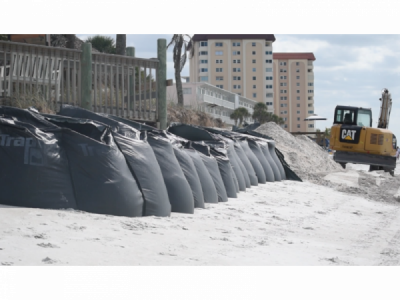
Posted on January 30, 2019
The sand from the $3.9 million dredge is being used to renourish nearby Lido Beach.
Work on the $3.9 million dredging of New Pass and nourishment of Lido Beach is nearly halfway done, Sarasota city officials said.
When the project is complete, nearly 185,000 cubic yards of sand will have been taken from New Pass, which connects Sarasota Bay and the Gulf of Mexico.
The dredging of New Pass follows the U.S. Coast Guard’s decision to remove the channel’s navigation markers — a signal to boaters the channel isn’t up to safety standards — in 2017. Coast Guard officials said prior they would re-examine the channel following the dredging to see if markers could be replaced.

The U.S. Coast Guard in 2017 pulled channel markers from New Pass, owing to its shallow conditions.
Once it has been dredged, the sand is transported nearly 2 miles to Lido Beach as part of an emergency nourishment project that began following the city’s local state of emergency declaration in May 2018.
The beach experienced critical erosion during Tropical Storm Hermine and Hurricane Irma, said Sarasota communications specialist Jason Bartolone. That erosion caused a threat to Lido’s beachfront infrastructure.
“Over this past hurricane season, we had to put out these large sand bags — trap bags — that we placed in front of the Lido Pavilion and the public beach area, and that was really just because of how necessary it was that we protect the area,” Bartolone said. “If we had just one storm with a certain level of waves, they would be going up over the dunes and impacting the infrastructure.”
The project was funded by the city, county, state and the Federal Emergency Management Agency.
Contractors can nourish around 150 feet of beach daily, and the mile-and-a-half-long project is scheduled to be complete mid-February.
Carl Shoffstall, Lido Key Resident’s Association President, said he was happy to see the renourishment project because the beach erosion has negatively impacted tourism in the area.
“When [tourists] come out here and stay at the hotels from the city they say, ‘What’s going on with the beach?’ ” Shoffstall said. “A lot of them are just not coming back since there’s no beach. [The project is] very important for tourist dollars.”
While he said he has seen improvements to the beach because of the emergency project, Shoffstall said he wishes it could have been incorporated into the larger nourishment project Sarasota has planned.
The larger project, which is in partnership with the Army Corps of Engineers, will take place over a 50 year period. The project, Shoffstall said, will save the city, and its taxpayers, money.
“We’re just anxious to get the big one started,” he said of the Big Pass project that is the subject of a court dispute between the city and Siesta Key residents’ groups who oppose it.
Bartolone said work is scheduled to begin in the fall.
Source: Your Observer





